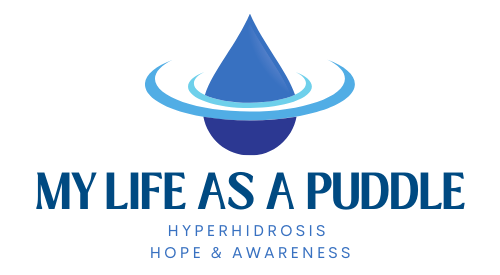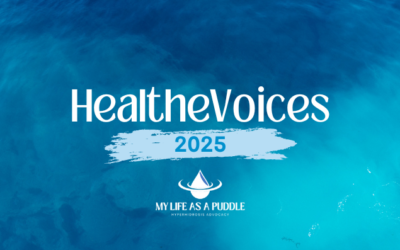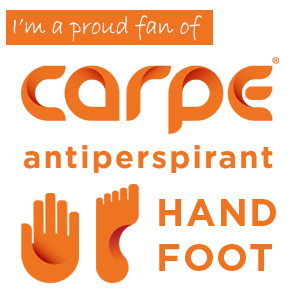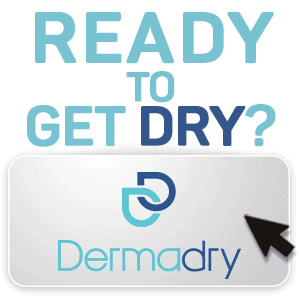Are you struggling to find a hyperhidrosis doctor? What about treatments for hyperhidrosis? In the following video, I discuss the difficulties when it comes to finding medical providers and access to treatment options for hyperhidrosis. Prefer to read the transcript instead? Just scroll down.
In the future for hyperhidrosis treatment options, I would like to see products that act locally versus systemically. So it would have a lower side effect profile because you’re using that product only on the areas that you’re affected with hyperhidrosis, and I would also like to see products that are affordable that insurance does cover, and that I don’t have to jump through a bunch of loop holes to get the medications that I need for a better quality of life.
Have you had difficulty finding healthcare providers who treat hyperhidrosis?
It’s been difficult for me to find healthcare providers who are familiar with and treat hyperhidrosis. The term hyperhidrosis itself I don’t feel is recognized as much as it should be in today’s day and age. So I’m trying to help reduce the stigma of hyperhidrosis through my blog, and the International Hyperhidrosis Society is doing a great job educating doctors, nurses, and other healthcare providers about what it’s like to have hyperhidrosis and what are the best treatment options.
How satisfied are you with healthcare providers’ knowledge of hyperhidrosis?
Right now I’m not actively seeking treatment for hyperhidrosis, so I feel like I would need to do a lot more research to find a doctor who actually is maybe certified through the International Hyperhidrosis Society or who has completed continuing medical education activities on this topic. I think it’s really important for doctors to invest the time in this condition. It’s under recognized and it’s under treated, largely in part because people either don’t know it’s a recognized medical condition, or they’re too embarrassed, or ashamed to speak up. So I think if we all work together to even just start saying the term hyperhidrosis, we can really take this to the next level.
What are the financial burdens associated with hyperhidrosis treatment?
The financial burdens associated with hyperhidrosis include finding a doctor or a specialty doctor like a dermatologist who is familiar with hyperhidrosis and then your insurance coverage. Your insurance may cover the office visit, but when you get around to the prescriptions, depending on the class of medication, whether it’s an oral medication or a topical medication, some of those may not be on the insurance company’s formulary list, which then requires a prior authorization from the doctor faxed over to the insurance company. If it’s a medication that’s newly FDA approved, that can take a lot of time to get covered.
So, again, you’re into that prior authorization process, the letter of medical necessity, things like that. So most people aren’t willing to fight with insurance companies or go through that lengthy process. They just want a treatment and it can be very discouraging when the insurance company refuses to cover it because they think it’s cosmetic versus an actual medical necessity.
Hyperhidrosis is not a cosmetic problem, it’s a physical problem that manifests in a physical way, and it affects people’s quality of life. So getting insurance to understand this condition and getting doctors to be able to prescribe the right medications for the right patients at the right time is crucial.
Have you or anyone that you know ever had trouble getting health insurance coverage for hyperhidrosis treatment?
I’ve heard of people having trouble getting hyperhidrosis treatment covered through their insurance. The ETS surgery, for example, that’s kind of the top line of therapy if you look at it from a pyramid perspective. So people or insurance companies actually want patients to try step therapy, so they want them to start off with prescription strength antiperspirants or oral medications, or botulinum toxin injections. ETS surgery is kind of the last resort [read why I’ll never get ETS surgery], and so it’s the most expensive treatment, and it requires anesthesia, and a hospital stay, and a whole entire care team around you. So the ETS surgery can become difficult to get insurance coverage for.
Have you or anybody that you know ever stopped hyperhidrosis treatment as a result of high cost or other access problems?
I’ve spoken with people who actually stopped their hyperhidrosis treatments either due to insurance no longer covering it because they would only cover X amount of treatment sessions for botulinum toxin, for example. So the other option is to pay out of pocket for those injections, and when you’re going in every six to nine months and spending at least $1,000 for those injections, that’s not very cost-effective. Some people that I know travel out of state to a dermatologist who administers these injections in their office. So not only is this person taking time off of work, but there are travel expenses involved, hotel stays, office visit copays, and then paying out of pocket for those injections. So it can become so expensive that people would rather live a sweat-ridden life than go into debt over this condition.
How has awareness of hyperhidrosis changed since you’ve been diagnosed and as you played a role in that awareness with your blog.
Hyperhidrosis awareness has changed in the last seven years, I think, but maybe that’s just because I’m more active in this space. I’ve been blogging from an entirely grassroots perspective for seven years, and that only came about for me, thanks in large part to the International Hyperhidrosis Society. So I’ve been doing a lot of volunteer work with them and just getting the word out. Hyperhidrosis has a huge stigma attached to it. People feel like they’re not enough, they’re not worthy of touch, and they are too embarrassed to speak up and seek treatment. So this year is the second annual Hyperhidrosis Awareness Month, so watch for more information on that and join the conversation because we need to give everyone with hyperhidrosis a voice.
Can you elaborate on evolving awareness of hyperhidrosis in health care.
The awareness of hyperhidrosis I think has come a long way since I was first diagnosed at age 12. Hyperhidrosis wasn’t a term I heard. I had to find that term myself through an Internet search at age 21. Now, I’m seeing commercials on TV, I’m seeing medical education activities. There are social media support groups. There’s an international nonprofit association dedicated to hyperhidrosis.
So I think we’re doing a really good job generating more conversation and also generating more treatment options – everything from prescription strength antiperspirants, to oral medications, to botulinum toxin injections, iontophoresis, surgery, and then all of the over-the-counter options as well, the clinical strength antiperspirants that are available over the counter. If you pull out the package insert in a lot of those, you will actually see the term hyperhidrosis in the package information, which is a huge win for all of us and for our community, that it’s becoming more mainstream and we’re having a conversation about it.
What advice and/or resources would you offer to other patients who have been recently diagnosed?
If you’ve been recently diagnosed with hyperhidrosis, my biggest suggestion is to do your own research. Keep in mind that a lot of these companies out there, if they pop up first in an internet search, that might be because they’re paying for advertising. A lot of these surgeons have large marketing budgets, and so you may be more inclined to see their information first. So make sure you’re doing your research and coming at this from a well-rounded perspective.
The best place you can start to do your research is at sweathelp.org. That’s the International Hyperhidrosis Society, and they are the only worldwide nonprofit dedicated to helping those with hyperhidrosis. For more information about what it’s like to live in my skin, you can visit my blog, mylifeasapuddle.com. I’m creating hope and awareness one drop at a time.
What advice would you offer to health care providers?
My advice for health care providers is to listen to your patients but also start asking them questions. Be the one to initiate the conversation in the exam room because a lot of patients won’t come forward. So, if you know which questions to ask to get them to feel comfortable enough to open up to you, you might have another hyperhidrosis diagnosis in your office.
Last question. What advice and/or resources would you offer to family or friends who have a loved one with hyperhidrosis?
If you have a family member or a friend with hyperhidrosis, ask them what they need to succeed.
- What do they want to see from you that will help them live a drier life?
- Is it turning down your thermostat?
- Is it giving them a hand towel to wipe their hands on?
- Is it giving them a pair of socks if they don’t have any with them so they can walk around on your bare floors and not worry about leaving footprints?
Just be open to having a conversation and watch where it takes you.
Video footage is courtesy of Pharmacy Times Continuing Education (PTCE) and is from their continuing medical education (CME) activity titled “Examining Hyperhidrosis (Excessive Sweating): A Managed Markets Update on New Treatments, Featuring a Patient Perspective” and was featured as a supplement in the December 2018 edition of the American Journal of Managed Care (AJMC).




